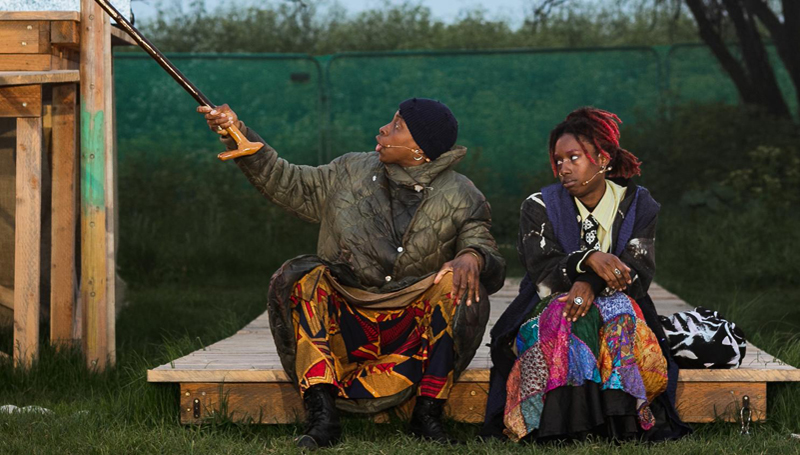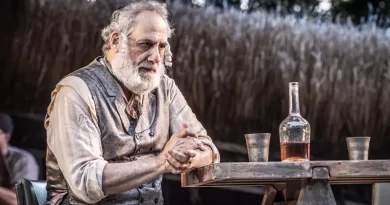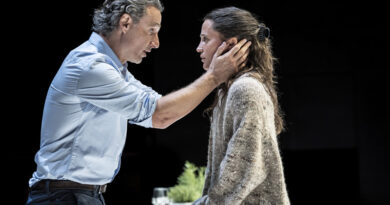“Galatea”, Brighton Festival
Simon Jenner in East Sussex
15 May 2023
If someone prophesied that John Lyly’s 1583 Galatea would be the most anticipated event of 2023’s Brighton Festival, you would expect it – at most – to be some Dome extravaganza: set to music with a bow-tied audience and something akin to Glyndebourne-by-Sea. And if you heard it grew from the Globe Wanamaker’s Read Not Dead series – whether or not you’d seen one – you might think it racy, unbuttoned perhaps, but high on candles.
Not Shoreham’s Adur grounds, where Marlborough Productions pitch Emma Frankland’s, Mydd Pharo’s and Subira Joy’s production; uproariously but faithfully edited by Andy Kesson. It’s a slog to get to, but you won’t see anything as joyously ground-breaking this festival. And it’s not a promenade performance.
Filleted with music, songs, performative gender-fluidity this Galatea uses BSL – and U.S. ASL for neuro-diversity – presided over by Duffy; bringing us gulphs of silence, making the hearing audience listen to it. Most, it celebrates love over fear, joy over stifling custom, letting normative resolution hang in the air as Queer love triumphs. There’s Indian street-food too.
It’s a project developed over 15 years from that RND event. Kesson’s modernized sub-plot and its language, rationalized characters with a few tweaks and renders this prescient and entertaining for 2023. Lyly’s the first British dramatist to use sub-plot, first to write a trilogy too. Kesson keeps what he terms Lyly’s ‘binary’ language. So, Lyly has each lover echo each other’s lines with variation; then once they fall in love, they say exactly the same things. Verbally their sexes fuse.
The story’s Lyly’s, originally set in Lincolnshire-on-Humber, away from Court, shifted to Little Shoreham. To prevent their being chosen as most beautiful sacrifices to wrathful Neptune and his monster, Galatea (Femi Tiwo) and Phillida (Macy-Jacob Seelochan), are disguised as boys by their fathers. Meeting, they fall for each other, uncertain of the other’s gender. Here we have no Viola-Cesario swap with Sebastian a fleeting presence at first, no Rosalind morphing back from Ganymede. Faced with Lyly’s texts, Shakespeare plays with, then dismisses fluidity. Out of Court, maybe prentice-boys, maybe times were getting gender-critical.
Initially Tiwo’s Galatea is performatively feminized by Lyly; Tiwo’s innocent, poised, plangent. Seelochan – who seizes their character with winning projection – nobly volunteers to be eaten.
Meanwhile an errant Cupid havocs through Diana’s chaste nymphs, uses the two lovers as bait, gets their own wings burned and starts a goddess wrestling-match umpired by Neptune. At which point, with Little Shoreham looking on, we scent resolution.
As Cupid, Wet Mess (uproarious recently in Sound of the Underground at the Royal Court) rushes about like Puck on acid. Surely Shakespeare plucked benign Puck from Lyly’s malign Cupid. Wet Mess declaims with a bounce, making Cupid their own: out to sting, a fantastically ruffed-up Elizabethan in lime-green wings that get plucked and singed, in set-and-costume-designer Mydd Pharo’s brilliant plumage. Caught, Cupid’s bait themself to that wrestling-bout.
This trio is superlative. Venus (Sophie Stone, seen for instance in The Curious Incident, or the Globe’s As You Like It and Emilia) commands in magenta, signs with vivid gestural clarity even for those who can’t read BSL, wrestles like a demon and dispenses, well like a goddess. Green-clad Diana (Nadia Nadarajah) is similarly fine in mostly vengeance-mode, scorching Cupid, curbing her now “wanton” nymphs. To Stone’s swirling motion, Nadarajah counters with a directional sweep as she hunts out transgressors, plucking out the inserted couple with a demotic dismissal.
This production features Pharo’s horseshoe stage, a backdrop hollowed onto trees behind, breathing pastoral. Joshua Pharo’s video and co-design with Sarah Readman though is where most work goes. On a large projection above the stage, surtitle text is well-illuminated in colours appropriate to characters (Venus rose, Diana emerald green, say) and to the side humble white, for mortals.
This is genuinely helpful, as though the production’s necessarily miced up, some younger performers aren’t ideally clear vocally, despite volume. At night, lighting and firebrands are stunning. Lyly’s songs set by Vicky Abbott as choruses, are smouldering, punchy, uplifting, if occasionally recessed.
There’s strong work from Telusa (Charlotte Arrowsmith, another Deafinitely luminary) as one of Diana’s leading nymphs, signalling delightful language. Of the two “boys” there’s a world of suggestion: “.. you were best, lady, to make them tusk these woods, whilst we stand with our bows, and so use them as beagles since they have so good mouths.” Though smaller roles, Eurota (Charmaine Wombwell), Larissa (composer Vicky Abbott), Ramia (Ashley Wilder) drench lines with delight, signed shouted and whooped, providing Bacchic spectacle early and midway.
Neptune (Steve Jacobs, a veteran of the project) is subdued: Neptune’s really Little Shoreham’s MP, though gorgeously arrayed by Pharo’s blue-green costume at one point. Clearly intentional, it leaves the character a little at sea, but allows him to slip through the plot convincingly disguised.
Hebe (Bea Webster) morphs from Journo-amanuensis to white-robed sacrifice, and delivers the greatest speech chained, graphically anticipating the monster. It’s mostly, not entirely signed. Contemptuously spared (Neptune’s not fooled) Hebe’s paradox is to proclaim: ”Had it not been better for thee to have died with fame, than to live with dishonour… I would Hebe had been more virtuous.” But Webster stomps relief, tinged with melancholy. “Virtuous” means beautiful. A devastating study in self-loathing, it shames us even more now.
Parent Melebeus – and scabrous Journalist – Ralph Bogard shines with stentorian anxiety, protecting Phillida; and is comically nasty persecuting washed-ashore refugee Rafe (Richard P. Peralta, a performance of projection and character) who ends working for Journalist, and earlier Alchemist (Antonia Kemi Coker) who’s just as bad an employer, but whose language is comically rich. Coker’s Galatea’s parent Tityrus, enjoys sparring with Bogard as each ignobly accuse the other of hiding a child, to save their own.
If Rafe’s plucked from rustic locality in Kesson’s rewrite, he still teams with local Peter (sparky, active Caz Teague) as their story fuses with the lovers. Kesson’s more radical with Peter, but after Neptune cries off sacrifices if Diana yields Venus her toasted Cupid, Peter becomes prime mover for a different resolution to Venus’s elegant one. It’s a thrill – the audience cheers – when Venus pronounces: “I like well and allow it.” There’s still a normative proposal though – Lyly leaves it hanging. It’s Peter who goes radical, to huge cheers.
There’s rough edges that’ll smooth out. A little vocal unevenness, some initial lack of clarity and pace that another performance should finesse. The second half – from late in Act Three – is finer. Webster’s dark monologue injects real pathos beyond the comic paradox, impels denouement. Tegue, Seelochan, Bogard, Peralta and Stone are given later lines to relish. Thankfully texts are on sale to make sense of it: with a scene involving Cupid’s penance tying bows cut.
No wrenching of tradition then, but reaffirming Lyly’s daring. If you’ve seen RND’s Galatea, or its prequel Sappho and Phao in August 2017 you might already think so. There Cupid turns on his mother Venus, falls for Sappho who he is meant to punish, and Venus-planted Phao gets nothing. Certainly not after James Askill’s proto-punk-Puck Cupid is seduced by Ferrero Rocher chocolates on a chaise-longue. With a wickedly ornate tease, the Edwards Boys performed Lyly’s 1597 The Woman in the Moon at St Mary Hill in March 2018. A tradition’s building.
Though Galatea marks one glorious reclamation for Queer dramas, it’s not alone but centres Lyly’s free-standing trilogy of transgression: something informing his eight surviving plays. RND is after 28 years on pause with director Patrick Spottiswoode’s retirement. So this homage to its project to perform all surviving plays 1567-1642, might serve as a grand epilogue, with a fresh text offered to subsequent performers. And prologue to what Kesson, Frankland, Joy, Duffy might bring next.
.
.
~









